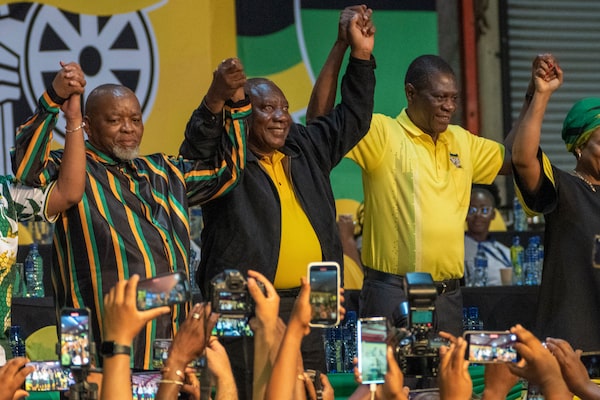
South African President Cyril Ramaphosa, center, celebrates after being re-elected African National Congress president at the ANC national conference in Johannesburg, South Africa, on Dec. 19.Jerome Delay/The Associated Press
South African President Cyril Ramaphosa has won a bitterly contested re-election for the leadership of the country’s ruling party at a conference that exposed the deep factional divisions undermining his government.
Mr. Ramaphosa secured another term as African National Congress president on Monday by a vote of 2,476 to 1,897 over his sole challenger, former health minister Zweli Mkhize – who was forced to resign from cabinet last year after allegations that his associates had benefited from a contract at his ministry.
Mr. Ramaphosa, a wealthy businessman and former union leader who replaced Jacob Zuma as President of South Africa in 2018, has been badly wounded by a scandal this year surrounding his own alleged corruption. A parliamentary inquiry said he may have violated laws in his handling of a mysterious cash payment of US$580,000 that was hidden in a sofa at his game ranch.
Despite the advantages of incumbency, Mr. Ramaphosa managed only a slight increase in his margin of victory from the previous ANC conference where he first became leader. He received 57 per cent of the vote this time, compared with 52 per cent in 2017.
His supporters celebrated wildly at the Johannesburg trade centre where the conference was held. South Africa’s currency strengthened by about 2 per cent against the U.S. dollar, as investors saw prospects for more stability.
The balloting revealed, however, that Mr. Ramaphosa still has a fragile grip on the ruling party. The ANC’s top seven leadership posts were all tightly contested, and his slate of candidates failed to win two of them. His close ally, Gwede Mantashe, was elected by a razor-thin margin of just 44 votes for the key post of national chairperson.
“He has a weak mandate because the margins are small,” said Susan Booysen, a South African political analyst and author of three scholarly books on the ANC.
“There are powerful positions on the top seven that he does not control. The fact that the deputy presidency has escaped his grasp in this election is very significant.”
Mr. Ramaphosa could now face a strong new rival within the ANC if he stumbles further on the corruption allegations that have already triggered an impeachment attempt in Parliament. The newly elected deputy president, Paul Mashatile, won about 50 per cent of the vote in a three-way race. He has avoided giving his allegiance to any faction and could become the ANC’s heir apparent.
“He’s very ambitious and he can’t be taken for granted,” Prof. Booysen said. “He can go in any direction where the strategy and tactics take him at any moment. He could be Cyril’s biggest friend, he could be Cyril’s biggest enemy.”
The ANC’s destructive internal feuding reached a new intensity on the eve of its leadership conference when Mr. Zuma announced an attempt to launch a private prosecution of Mr. Ramaphosa. The former president is seeking to imprison the incumbent for up to 15 years for allegedly failing to take action against a state prosecutor in Mr. Zuma’s continuing trial on corruption charges of his own.
Mr. Ramaphosa’s officials blasted Mr. Zuma for the attempted private prosecution – a rare legal manoeuvre that requires official proof that no public prosecution is planned.
“We are now facing an all-out war that is inspired by deep-seated personal hatred seeking to burn everything and anything in its path,” presidential spokesperson Vincent Magwenya tweeted after Mr. Zuma’s announcement.
Mr. Zuma’s supporters refused to back down, throwing their support to Mr. Mkhize in the leadership race. They noisily heckled and disrupted Mr. Ramaphosa in his opening speech to the conference, triggering scenes of chaos as security guards battled to restore order.
In a lengthy “political report” to the conference, Mr. Ramaphosa said the ANC’s unity has been destroyed by the “corrosive effects” of graft, patronage and battles for the spoils of government.
“Our experience of recent years is that disunity does not arise from ideological, political or strategic differences, but from a contest over positions in the state and the resources that are attached to them,” he said in the report.
“It therefore follows that the achievement of real unity will not be possible until our organization is free from the influence of corruption and patronage.”
In a vivid example of the persistence of corruption within the party, the ANC conference was marred by allegations of bribery and vote-buying.
“Every delegate has been offered money in this conference,” 22-year-old delegate Penuel Maduna told the Sunday Times, a leading South African weekly newspaper.
The ANC’s factional struggles have sent the party into a long-term decline, with polls showing it could fall below 50 per cent of the vote in the next election in 2024. This would force it to seek coalition – as has already happened in several major cities, where the ANC has increasingly been pushed out.
The factional feuding has also heavily damaged the Ramaphosa government. Bitter disputes over energy policy have stalled a series of desperately needed decisions on renewable energy, leaving South Africa paralyzed by near-permanent electricity shortages.
Even as the ANC opened its conference on the weekend, the electricity cuts worsened and South Africans were hit with power cuts of up to 10 hours a day.
Amid growing reports of sabotage, the government announced on the weekend that military personnel would be deployed at four power stations in a bid to prevent theft and vandalism.
 Geoffrey York
Geoffrey York